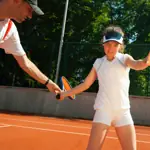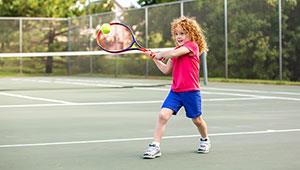
Tennis as a sport has evolved. The style of play that was winning matches when my coaching career began wouldn't translate into a victory on today's tour.
When I reflect on my time with Brian Gottfried, former No. 1 in the world in doubles and No. 3 in singles, I remember teaching him the eastern forehand grip; we also developed his astounding backhand.
If Brian walked onto a court today to play against Rafael Nadal or Roger Federer he would have a problem using his old game.
However, if I coached Brian using the semi-western grip I know he could be a top 10 player today. This is just one example of how not only the game has evolved, but coaching has also been transformed.
More: Tennis Coach's Guide to Teaching
The days of your old-fashioned one-hour lesson every week with each student is long gone and for very good reasons.The coach is no longer simply only an instructor. You're a surrogate parent, mediator, peacekeeper, publicist and motivator. You're also their travel agent and confidante.
The challenge of working with young athletes must be completely understood in order to become a fully engaged coach.Remember, coaches come and go. Be sure to establish a professional relationship with your student from the get go. This will ensure your protection in the ever changing tides of the student-coach dependency.
The junior player is not only young, he is also inexperienced. The young player today must survive in a new millennium, an age of fast computers, fast cars and fast feet. It's also not unusual for the student to have absentee parents. Such formidable obstacles would turn back many adults.
More: Drill of the Week: Tennis One-Handed Backhand for Kids
The Dos and Don'ts of Coaching Junior Tennis
Do Listen.
Don't put aside your principles, but do discard your personal agenda. Children deliver subtle messages. Many times these messages are questions that you can answer. Be grateful that you have the wisdom and can guide your student during these formative exchanges.
Do Accept the Challenge.
Acknowledge and accept the challenge of being a positive effect in a young life.
Don't think You Can Do This Alone.
You must have the cooperation and support of your athlete's parents.
Don't Stop When the Tennis Lesson Ends.
Stay focused on your student and some not-so-silent distractions facing them today.
I've had many coaches and parents reach out to me concerning how to maintain the integrity of their students training program, while also confronting split families, bullying, drugs and alcohol, and our current economy.
More: 10 Tennis Tournaments for Kids this Summer
Unfortunately, many children also come from backgrounds that may lack sports programs being introduced in local schools or community parks. In addition, you must also be intimately aware of your athlete's fitness, eating habits, and that they maintain healthy relationships with their family.Coaches and educators in our complex society carry a great deal of responsibility. Like all life's experiences, the greater challenge, the sweeter the reward.
You can change the direction of a young person's life. You can make an adjustment in a professional player's game that can change the course of their career.
This is a burden that may seem heavy when you're in the trenches. However, when you lay your head on your pillow each night you will feel a sense of pride in not only in your athlete, but also in yourself. This is the privilege we have been given in coaching.
 Find kids tennis camps and lessons near you.
Find kids tennis camps and lessons near you.
About the Author







Discuss This Article